
Cognition Technology & Work
Scope & Guideline
Advancing Understanding of Cognition in the Workplace
Introduction
Aims and Scopes
- Human-Technology Interaction:
The journal explores how humans interact with various technologies, including automation, artificial intelligence, and user interfaces, emphasizing the cognitive aspects of these interactions. - Workplace Design and Usability:
Research focuses on designing workplaces and technologies that enhance usability and cognitive performance, incorporating human-centered design principles. - Cognitive Load and Performance:
Studies often investigate how cognitive load affects performance in high-stakes environments, aiming to optimize task design and training methods. - Resilience and Safety:
The journal addresses issues of resilience and safety in work environments, particularly in sectors like aviation, healthcare, and transportation, using cognitive and human factors approaches. - Emerging Technologies and Their Impact:
Research includes the implications of emerging technologies such as AI, robotics, and automation on work processes, safety, and cognitive performance.
Trending and Emerging
- Human-AI Collaboration:
There is an increasing focus on how humans and AI systems collaborate, particularly in decision-making processes, highlighting the importance of explainability and trust in AI. - Cognitive Resilience and Adaptation:
Research is trending towards understanding cognitive resilience and adaptability in high-stress environments, emphasizing the need for systems that support human operators' mental well-being. - Impact of Remote Work and Technostress:
The COVID-19 pandemic has spurred interest in the effects of remote work on cognitive performance and technostress, with studies exploring strategies to mitigate these challenges. - Contextual and Adaptive Interfaces:
Emerging studies focus on developing adaptive interfaces that respond to users' cognitive load and context, aiming to enhance user experience and performance. - Interdisciplinary Approaches:
There is a growing trend towards interdisciplinary research that combines insights from cognitive science, technology studies, and human factors to address complex work challenges.
Declining or Waning
- Traditional Ergonomics:
While ergonomics remains important, there is a noticeable decline in studies focusing solely on physical ergonomics, as the journal shifts more towards cognitive ergonomics related to technology interaction. - Generalized Automation Studies:
Previous studies on automation's general effects are declining, with a shift towards more specific investigations into human-automation interaction and decision-making processes. - Static Usability Studies:
Research centered on static usability assessments is less frequent, as the field moves towards dynamic usability testing that considers real-time interactions and cognitive workload.
Similar Journals
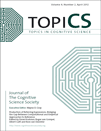
Topics in Cognitive Science
Unraveling Cognitive Mechanisms for a Digital AgeTopics in Cognitive Science, published by WILEY, is a premier interdisciplinary journal that advances the understanding of the cognitive processes that underpin human behavior and interaction with technology. With a commendable impact factor and a strong focus on research from 2009 to 2024, this journal garners significant attention in various subfields, as evidenced by its Q1 ranking in Experimental and Cognitive Psychology and Linguistics and Language, alongside a Q2 position in Artificial Intelligence, Cognitive Neuroscience, and Human-Computer Interaction. Researchers and professionals will find invaluable insights into the latest experimental findings, theoretical discussions, and practical applications that bridge cognitive neuroscience, psychology, and computer science. Topics in Cognitive Science is especially pivotal for those aiming to delve deeper into cognitive mechanisms and their implications within our increasingly digital world, making it an essential resource for students and scholars alike.

THEORETICAL ISSUES IN ERGONOMICS SCIENCE
Exploring the Frontiers of Ergonomics TheoryTHEORETICAL ISSUES IN ERGONOMICS SCIENCE, published by Taylor & Francis Ltd, is an essential academic journal that delves into the complexities of ergonomics and human factors, catering to researchers and professionals in the field. With an ISSN of 1463-922X and an E-ISSN of 1464-536X, this journal has established itself as a significant contributor to scholarly discourse since its inception in 2000. Operating out of the United Kingdom, it has earned a respectable Q3 ranking in Human Factors and Ergonomics as of 2023, reflecting its impactful research contributions within the social sciences. The journal aims to foster interdisciplinary dialogue and innovation, addressing key theoretical frameworks that influence ergonomic practices and research. While offering a traditional publication model, it is committed to maintaining high academic standards, as indicated by its position in the 64th percentile among its peers, ranking #17 out of 46 within its category in Scopus. THEORETICAL ISSUES IN ERGONOMICS SCIENCE is an indispensable resource for those seeking to enhance their understanding and application of theoretical concepts in ergonomics, and a platform for disseminating cutting-edge research findings.
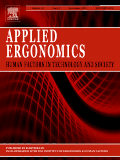
APPLIED ERGONOMICS
Connecting Research and Practice to Improve Human Interaction with TechnologyWelcome to Applied Ergonomics, a premier journal dedicated to advancing knowledge and practice in the multidisciplinary field of ergonomics and human factors. Published by Elsevier Science Ltd, this esteemed journal features a diverse range of research covering critical aspects of physical therapy, human factors, safety, and engineering. With an impressive impact factor and consistently ranked in the Q1 category across multiple domains—including Engineering, Human Factors and Ergonomics, and Safety—Applied Ergonomics serves as a vital resource for researchers, professionals, and students aiming to enhance user experience and optimize workplace safety. With its extensive historical archive dating back to 1969 and continuing through 2025, this journal encourages the dissemination of innovative applications and research findings that contribute to the ergonomics body of knowledge. For those interested in cutting-edge research that directly impacts health and safety practices, Applied Ergonomics is the authoritative source.
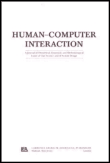
HUMAN-COMPUTER INTERACTION
Shaping Tomorrow's Technology with Today's InsightsHUMAN-COMPUTER INTERACTION is a premier academic journal published by Taylor & Francis Inc, dedicated to the interdisciplinary field of HCI, which explores the dynamic interactions between humans and computers. With its ISSN 0737-0024 and E-ISSN 1532-7051, the journal maintains a strong presence within the academic community and is recognized for its significant impact, holding a commendable impact factor that underscores its relevance. Ranked in the Q1 category for both Applied Psychology and Human-Computer Interaction, it occupies a critical position in Scopus rankings, listed as #15 in Applied Psychology and #11 in Computer Science, Human-Computer Interaction, placing it in the top 6% of relevant fields. Covering a broad spectrum of topics from usability studies to user experience design, the journal aims to facilitate innovative research and provide insights that bridge theoretical frameworks and practical applications. Published since 1985 and continuously evolving, HUMAN-COMPUTER INTERACTION remains an essential resource for researchers, professionals, and students eager to contribute to and benefit from advances in understanding how technology can effectively serve human needs.

Multimodal Technologies and Interaction
Advancing Interdisciplinary Dialogue in Technology.Multimodal Technologies and Interaction, published by MDPI since 2017, is an esteemed open-access journal based in Switzerland, dedicated to the exploration and advancement of innovative multimodal systems that enhance user experience across various digital platforms. With its commitment to disseminating high-quality research in diverse areas such as Computer Networks and Communications, Human-Computer Interaction, and Neuroscience, the journal has rapidly established itself within the academic community, achieving a commendable position in Scopus rankings including Q2 in both Computer Networks and Communications and Computer Science Applications. As an essential resource for researchers, professionals, and students alike, Multimodal Technologies and Interaction fosters interdisciplinary dialogue and supports the development of cutting-edge technologies, ensuring that advancements in multimodal interaction are accessible to a global audience. Scholars can benefit from its Open Access format, allowing unrestricted access to influential studies that shape the future of technology and interaction design.
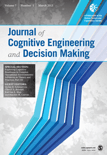
Journal of Cognitive Engineering and Decision Making
Advancing cognitive insights for better decision-making.The Journal of Cognitive Engineering and Decision Making, published by SAGE Publications Inc, stands at the forefront of interdisciplinary research in the fields of applied psychology, human factors, computer science applications, and engineering. Established in 2007, this esteemed journal reflects a commitment to advancing the understanding of cognitive processes and decision-making methodologies through rigorous scholarly articles. With an impressive impact factor and categorized within the prestigious Q1 and Q2 quartiles across pertinent fields, the journal provides a vital platform for researchers, professionals, and students aiming to enhance the intersection of cognition and engineering practices. Subscribers can access a wide array of articles that delve into cutting-edge research, practical applications, and innovative developments, all while contributing to the ongoing dialogue surrounding human-centric design and decision-making strategies. As the journal continues through its converged years until 2024, it promises to play an essential role in shaping the future discourse in cognitive engineering and decision-making.
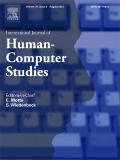
INTERNATIONAL JOURNAL OF HUMAN-COMPUTER STUDIES
Illuminating the Future of Human-Computer StudiesINTERNATIONAL JOURNAL OF HUMAN-COMPUTER STUDIES, published by Academic Press Ltd - Elsevier Science Ltd, stands at the forefront of research dedicated to the dynamic interplay between humans and technology. With a remarkable impact factor reflective of its rigorous academic standards and its prestigious ranking in the Q1 category across vital disciplines such as Education, Engineering, Human Factors and Ergonomics, and Human-Computer Interaction, this journal serves as an essential resource for researchers, professionals, and students alike. Spanning from 1994 to 2024, it showcases pioneering studies that contribute significantly to the understanding of cognitive processes, usability, and the evolving role of technology in society. Despite the absence of Open Access options, access to this journal is facilitated through institutional subscriptions, ensuring that critical findings and advancements are readily available to a global audience. By continuing to publish high-quality research, the INTERNATIONAL JOURNAL OF HUMAN-COMPUTER STUDIES plays a crucial role in advancing the field, fostering innovation, and guiding future research directions.

ACM Transactions on Applied Perception
Exploring the Nexus of Perception and ComputationACM Transactions on Applied Perception is a leading journal published by the Association for Computing Machinery, focusing on the intersection of perception science and computational methods. With an ISSN of 1544-3558 and an E-ISSN of 1544-3965, this esteemed publication has been a vital resource for innovators and researchers since its establishment in 2004. It operates within the ambit of Computer Science and the realms of Experimental and Cognitive Psychology, boasting a commendable impact factor and category rankings, including Q2 in Computer Science (miscellaneous) and Q3 in both Experimental and Cognitive Psychology and Theoretical Computer Science. The journal's scope encompasses a plethora of studies aimed at understanding human perception through computational lenses, making it an essential platform for scholarly exchange. Although it does not currently offer an Open Access option, its extensive reach and rigorous peer-review process ensure high visibility and impact in the academic community. By fostering collaboration across disciplines, ACM Transactions on Applied Perception encourages advancements that bridge perceptual research with practical applications, making it invaluable for researchers, professionals, and students engaged in this dynamic field.

MEMORY & COGNITION
Fostering Innovation in Cognitive PsychologyMEMORY & COGNITION is a premier journal published by SPRINGER, dedicated to advancing the understanding of cognitive processes related to memory. Established in 1973, this esteemed journal covers a wide range of topics within the fields of experimental and cognitive psychology, neuropsychology, and physiological psychology, cementing its status as a leading voice in the arts and humanities. With an impressive impact factor and a consistent Q1 ranking across multiple categories, MEMORY & COGNITION attracts high-quality research that elucidates the intricacies of memory function and cognition. The journal is nestled within the competitive landscape of academic publishing in the United States and maintains robust accessibility options, inviting both quantitative and qualitative analyses from researchers, professionals, and students alike. By fostering interdisciplinary dialogue and collaboration, this journal plays a pivotal role in shaping the future of cognitive research, making it an invaluable resource for its readership.

MINDS AND MACHINES
Advancing the Dialogue Between Minds and MachinesMINDS AND MACHINES is a distinguished peer-reviewed journal published by Springer, specializing in the interdisciplinary realms of Artificial Intelligence and Philosophy. Founded in 1991, this journal continues to serve as a critical forum for exploring the intricate relationships between human cognition, artificial systems, and ethical considerations in technology. With an impressive impact factor positioned in the Q1 quartile for both the fields of Artificial Intelligence and Philosophy, MINDS AND MACHINES ranks as a top-tier publication, reflecting its significant contributions to ongoing scholarly discussions. The journal is indexed in Scopus, where it holds the number one rank in Philosophy within the Arts and Humanities category, and the 42nd position in the Computer Science segment for Artificial Intelligence, demonstrating its wide-reaching influence and high citation impact. Although it does not offer open access, its rigorous selection process ensures that only high-quality manuscripts are published, making it an essential read for researchers, professionals, and students aiming to stay at the forefront of developments in these rapidly evolving fields.